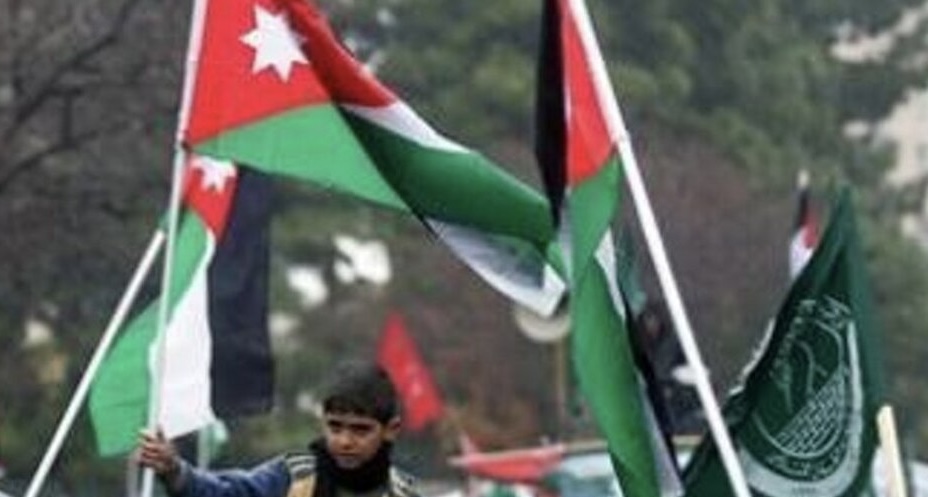Amman: thousands on the streets for days, want end to realtions with Israel
A spontaneous movement started on 24 March when a crowd marched towards the long-closed Israeli embassy. In response to the demonstrations, the police made arrests and accused the demonstrators of "aggression". Fr. Rifa Badert: fears of internal violent drift, fundamental to resolve the Palestinian question.
Amman (AsiaNews) - The repercussions of the war in Gaza are becoming more and more evident in Jordan, which has long been the scene of street protests by angry citizens who attack the government for its "rhetoric" on the conflict, loudly calling for the end of the treaty of peace with Israel.
Demonstrations that agitate the nights of Amman, behind which according to the institutions of the Hashemite kingdom - among the most critical voices of the Jewish State - there are "infiltrators" and "agitators" who intend to fuel the disorder and internal discontent already tense after the attack on Tower 22.
"We are in the month of Ramadan, every night after iftar [meal that breaks the fast] people go out and gather near the Israeli embassy to demonstrate" Fr. Rifat Bader, director of the Catholic Center for Studies and Media (CCSM) confirms to AsiaNews.
For the eleventh consecutive night, thousands of Jordanian citizens took to the streets to protest against the war in Gaza and demand the severing of ties with Israel.
An apparently spontaneous movement that began on March 24, when a crowd marched towards the Israeli embassy in the capital - which was also evacuated months ago - following a series of appeals made on social media.
Among the messages and requests bounced online, the invitation to "lay siege" to the diplomatic representation and the end of the peace treaty signed by Amman with the Jewish state in 1994.
The protests have gained increasing momentum and vigor in recent days; in response, Jordanian security forces made a series of arrests and accused the protesters of resisting a public official or attacking police officers deployed to protect public order.
Protests, which have been frequent in many parts of the Arab and Middle Eastern world since the beginning of the conflict on 7 October, have taken on unprecedented consistency and persistence in Israel's eastern neighbor. So much so that some Jordanian officials have gone so far as to accuse "foreign agents" or "disturbers" of fomenting the unrest.
“We are the closest nation to Palestine and about half of the Jordanian population itself is of Palestinian origins - continues Fr. Bader, head of the Catholic news site abounga.org, among the most authoritative personalities of the local Church - therefore the issue is felt. In particular the victims among women, children and elderly people in Gaza." The (unconfirmed) news of sexual violence by Israeli soldiers against women in the Strip is further fomenting anger.
“They chant slogans against Israel, the United States, but also against the weakness of part of Arab public opinion. We must all - he concludes - pay attention to avoid a violent drift and prevent someone from outside from maneuvering to disturb Jordanian society. This is also why a solution to the Palestinian problem is increasingly urgent, with the end of the occupation and the birth of a state."
Meanwhile, the Foreign Affairs Commission of the Lower House of Parliament in Amman has issued a note in which it rejects "any attempt carried out by a small infiltrated group, which seeks to sabotage and undermine national unity".
In addition, MP Khaldoun Hina, head of the commission itself, shared a video on Gaza” and the repeated condemnation of Israeli military operations. Former Jordanian Information Minister Samih Al-Maaytah is even more explicit, claiming in an interview with the Saudi channel al-Hadath that Hamas leaders in Qatar have fomented unrest in Jordan.
Analysts and experts underline how the country is more vulnerable than others in the region in the face of a possible wave of protests, not only due to the high percentage of Palestinians among the population (estimated at around 50%), but also due to the room for maneuver granted to Muslim movements.
These include the Jordanian Muslim Brotherhood and its political representative, the Islamic Action Front, the International Union of Muslim Scholars (IUMS), based in Qatar, considered "terrorist" in other Arab nations. Witnesses report that one of the most popular chants in these days of protest was "All of Jordan is Hamas", combined with the most famous and used in other parts (such as Iran) "Death to America, death to Israel".
Since the first days of the war, the Hashemite kingdom has been one of the most critical voices of Israel, the first nation to recall its ambassador from Tel Aviv and several times at the forefront in calling for a ceasefire in the Strip as well as working for the handover of humanitarian aid.
The King of Jordan Abdullah II himself personally participated in the launches from the planes on more than one occasion, in coordination with Israel. And Queen Rania went so far as to affirm that the humanitarian crisis in Gaza is “deliberate”.
Nonetheless, the leadership's anti-Israel rhetoric and actions in support of the Palestinians did not seem sufficient to many citizens, who called for stronger action.
07/10/2023 14:29
12/12/2022 12:12







.png)










